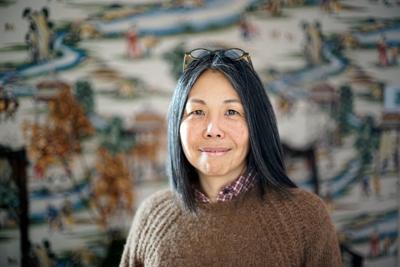Even as anti-Asian violence has risen during the coronavirus pandemic, some say it fails to get the attention it deserves.
When eight people, including six women of Asian descent, were killed Tuesday at Atlanta-area massage parlors, a witness heard the shooter shout he would “kill all the Asians.”
While the suspect has denied that he was motivated by racism, Asian Americans in the Berkshires and beyond have questioned what it would take for anti-Asian racism to generate greater discussion.
“The media don’t cover it fully or they don’t cover it at all,” said Setsuko Winchester, a New York-born artist and writer of Japanese ancestry who lives in Sandisfield. “Lawmakers and our community leaders need to speak up and say this is not acceptable.”
In Berkshire County, incidents of verbal aggression during the pandemic have left some people of Asian descent “afraid to leave their homes,” according to the NAACP Berkshire County branch. An increase in hate crimes also has worried some local lawmakers and law enforcement officials.
While some do find the Berkshires to be friendly — including workers who spoke with The Eagle at two North Adams businesses Thursday — verbal attacks can make people of Asian descent feel unsafe or unwelcome, reinforcing perceptions that they are “perpetual foreigners” in the U.S., said Pittsfield City Councilor Helen Moon.
“A lot of the attacks are happening in the business places — so, people’s places of work — and they’re happening to our elders,” said Moon, who is Korean American. “I think about my parents, and how would they handle a situation like this?”
Perceived outsiders
Immigration laws and media narratives, among other influences, long have painted people of Asian ancestry as outsiders who threaten white Americans’ well-being — well before former President Donald Trump called China’s economic rise “a threat to the world” or blamed China for the pandemic. Congress passed the Page Act of 1875, for example, over fears that Chinese women would threaten the institution of marriage and that Chinese men would take white men’s jobs. While the law targeted “undesirable” sex workers and forced laborers, its enforcement allowed immigration officers to brand almost all Chinese women as prostitutes, barring their entry.
It’s no coincidence that anti-Asian violence during the pandemic primarily has targeted women, whose bodies, historically, have been sexualized and fetishized, says Dorothy Wang, a professor of American studies at Williams College. The suspect in the Georgia shootings, 21-year-old Robert Aaron Long, told police he had a “sexual addiction” and that the spas he targeted represented “a temptation” that he “wanted to eliminate.”
While it’s not known whether the women killed Tuesday engaged in sex work, some see the shooting, as well as the suspect’s conflation of Asian massage parlors and sex work, as an expression of stereotyping of and prejudice against sex work. U.S. military involvement in wars in the Philippines, Japan, Vietnam and Korea, Wang said, has contributed to dehumanizing perceptions of Asian and Asian American women as submissive and sexually available to white men.
“Local sex workers who are economically disadvantaged end up as an integral part of the economy around military bases,” Wang said. “Racial and sexual attitudes about these women are recycled back in the United States. ... Their lives, like all Asian lives, are seen as disposable.”
Silencing stereotypes
Many believe that Asian Americans are discouraged from discussing racism, and some who have spoken up feel that they have been silenced.
The “buried” histories of anti-Asian racism that Winchester explores in her “The Dissent Collars” project, she said, largely are left out of history textbooks. And her attempts to draw attention to those topics have been rejected by newspaper editors and museum directors.
“The other trope that’s repeated all the time is: Why don’t you guys speak up?” Winchester said. {span}“{span}I am proof that it doesn’t matter because nobody is going to listen to us anyway.{/span} I have spoken up time and time again, and I’m still left out of the conversation.”{/span}
Li Yu, a professor of Asian studies at Williams, said people who speak out often go unacknowledged or face backlash, leading many to stay silent to protect themselves.
“I wouldn’t say it is particularly anti-Asian racism, but somehow, even at a place like Williams College, there is this workplace culture in which Asian and Asian American female professors had to undergo and suffer too much bullying behaviors from our white, male colleagues if we speak our minds,” Yu said.
“It is as if we were a lesser human being and we had to be submissive and be this ‘smiling minority’ all the time.”
The “model minority” stereotype, which portrays Asian Americans as successful, largely robotic workers who can achieve status of honorary whiteness, serves to suppress discussion of anti-Asian racism, Wang said.
“It implies that being ‘model’ means being quiet, compliant, a good worker for capitalist society,” Wang said. “Asian Americans are expected to stay quiet, not to protest about anything, especially racial injustice.”
By emphasizing perceived differences between racialized groups, that stereotype also has served to undermine the cross-racial solidarity that Wang believes is necessary to counteract racism against all those groups.
“Blacks and Asian Americans and Latinx and Indigenous people should join together in solidarity to fight racial capitalist injustice,” Wang said. “All ... have suffered from the logic of racial hierarchies and white supremacy in this country, though the concrete particulars of that suffering may be different for each group.”


